MGBBT0FYP Research: Inflation Impact on Verdant Leisure & SMEs
VerifiedAdded on 2023/06/04
|11
|2024
|119
Report
AI Summary
This report investigates the impact of inflation on tourism SMEs, using Verdant Leisure as a case study. It begins by defining inflation and outlining key indicators like the Consumer Price Index (CPI) and Personal Consumption Expenditure (PCE). The report then presents data highlighting the challenges faced by tourism SMEs due to rising costs, staffing issues, and wage inflation. Both the positive and negative impacts of inflation on the tourism sector are discussed, including the erosion of purchasing power and potential short-term growth. Finally, the report suggests solutions for mitigating the negative effects of inflation, such as streamlining public-private interfaces and ensuring transparent communication of protocols. The conclusion emphasizes the significant impact of post-COVID inflation on the tourism sector and the importance of government measures to support affected businesses.
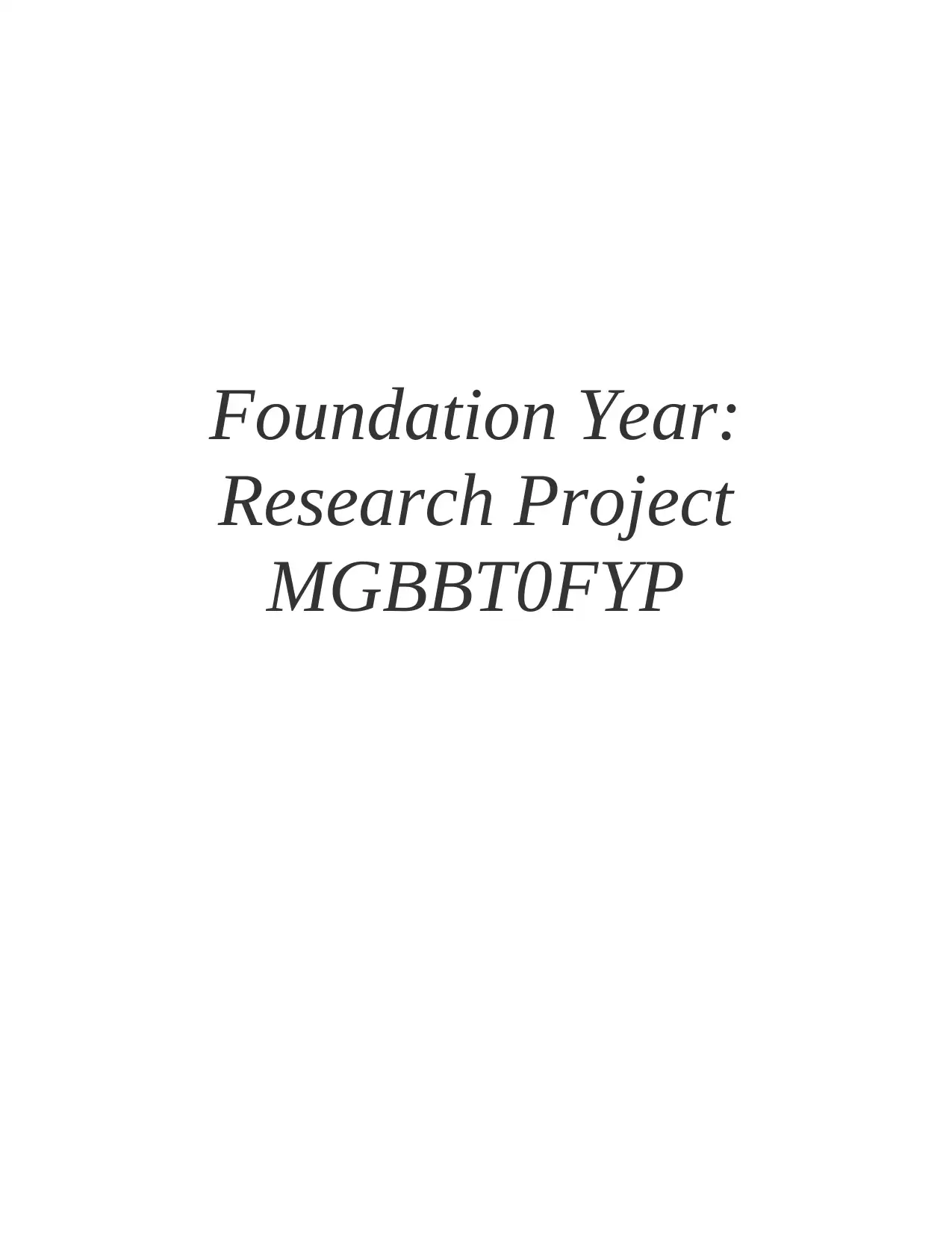
Foundation Year:
Research Project
MGBBT0FYP
Research Project
MGBBT0FYP
Paraphrase This Document
Need a fresh take? Get an instant paraphrase of this document with our AI Paraphraser
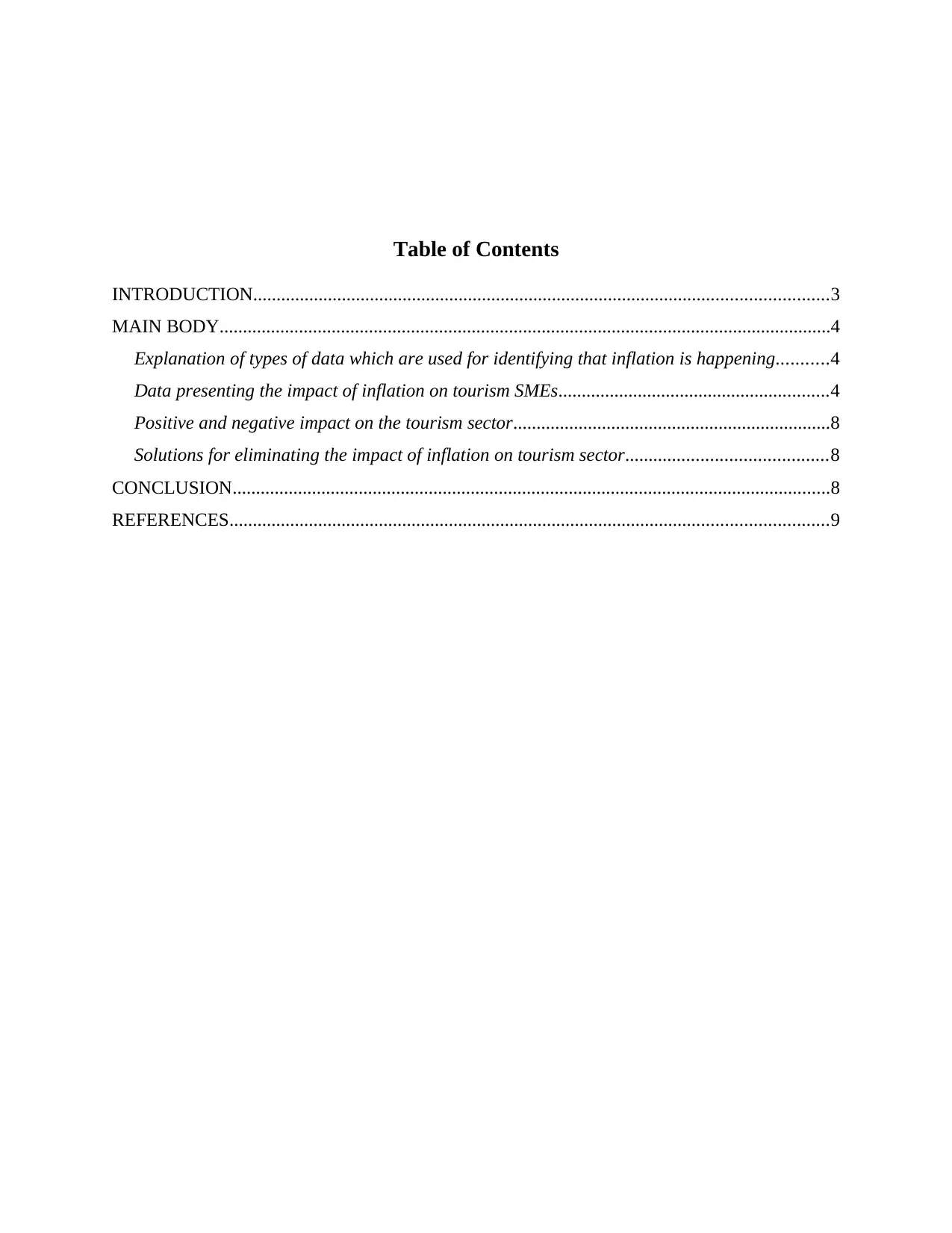
Table of Contents
INTRODUCTION...........................................................................................................................3
MAIN BODY...................................................................................................................................4
Explanation of types of data which are used for identifying that inflation is happening...........4
Data presenting the impact of inflation on tourism SMEs..........................................................4
Positive and negative impact on the tourism sector....................................................................8
Solutions for eliminating the impact of inflation on tourism sector...........................................8
CONCLUSION................................................................................................................................8
REFERENCES................................................................................................................................9
INTRODUCTION...........................................................................................................................3
MAIN BODY...................................................................................................................................4
Explanation of types of data which are used for identifying that inflation is happening...........4
Data presenting the impact of inflation on tourism SMEs..........................................................4
Positive and negative impact on the tourism sector....................................................................8
Solutions for eliminating the impact of inflation on tourism sector...........................................8
CONCLUSION................................................................................................................................8
REFERENCES................................................................................................................................9
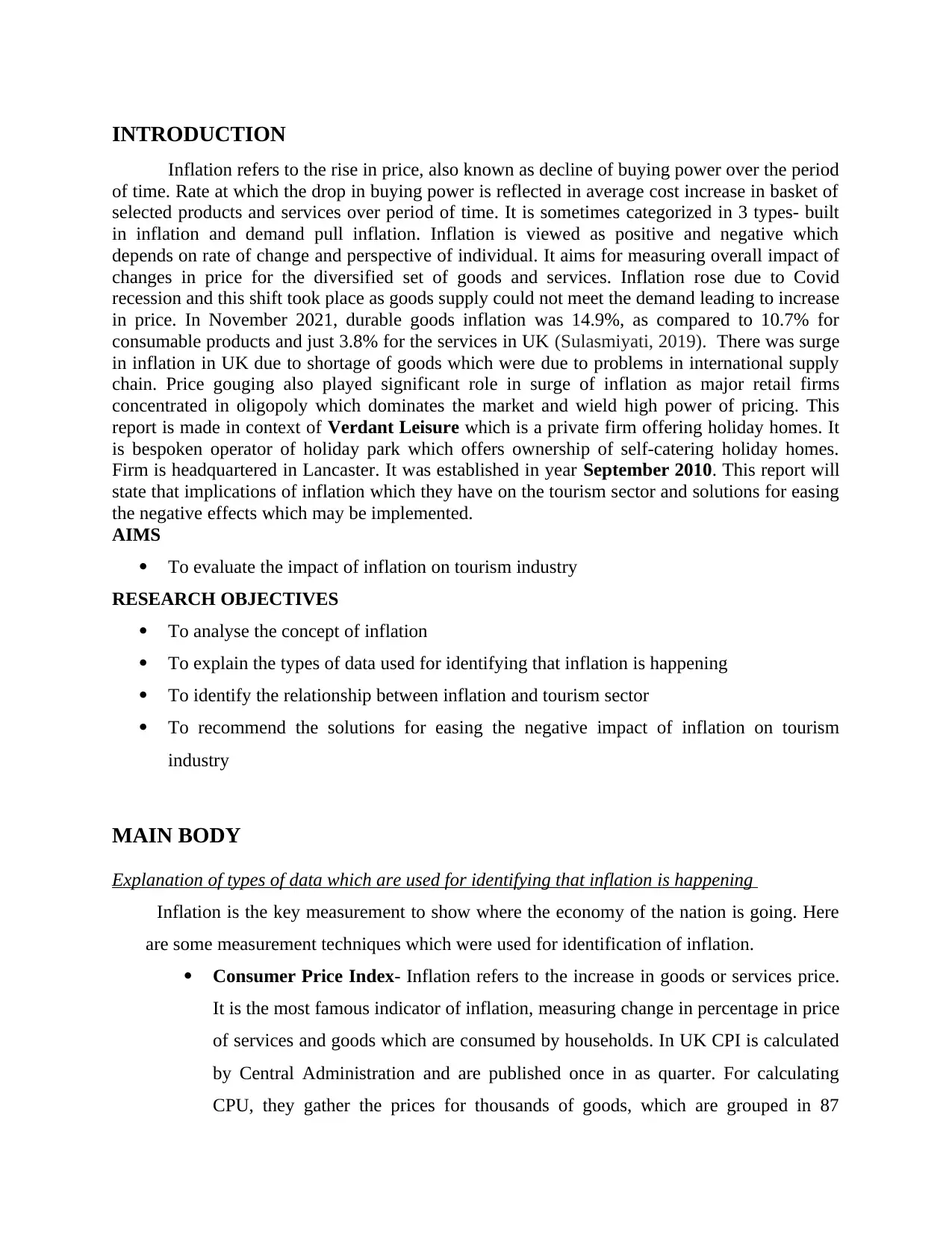
INTRODUCTION
Inflation refers to the rise in price, also known as decline of buying power over the period
of time. Rate at which the drop in buying power is reflected in average cost increase in basket of
selected products and services over period of time. It is sometimes categorized in 3 types- built
in inflation and demand pull inflation. Inflation is viewed as positive and negative which
depends on rate of change and perspective of individual. It aims for measuring overall impact of
changes in price for the diversified set of goods and services. Inflation rose due to Covid
recession and this shift took place as goods supply could not meet the demand leading to increase
in price. In November 2021, durable goods inflation was 14.9%, as compared to 10.7% for
consumable products and just 3.8% for the services in UK (Sulasmiyati, 2019). There was surge
in inflation in UK due to shortage of goods which were due to problems in international supply
chain. Price gouging also played significant role in surge of inflation as major retail firms
concentrated in oligopoly which dominates the market and wield high power of pricing. This
report is made in context of Verdant Leisure which is a private firm offering holiday homes. It
is bespoken operator of holiday park which offers ownership of self-catering holiday homes.
Firm is headquartered in Lancaster. It was established in year September 2010. This report will
state that implications of inflation which they have on the tourism sector and solutions for easing
the negative effects which may be implemented.
AIMS
To evaluate the impact of inflation on tourism industry
RESEARCH OBJECTIVES
To analyse the concept of inflation
To explain the types of data used for identifying that inflation is happening
To identify the relationship between inflation and tourism sector
To recommend the solutions for easing the negative impact of inflation on tourism
industry
MAIN BODY
Explanation of types of data which are used for identifying that inflation is happening
Inflation is the key measurement to show where the economy of the nation is going. Here
are some measurement techniques which were used for identification of inflation.
Consumer Price Index- Inflation refers to the increase in goods or services price.
It is the most famous indicator of inflation, measuring change in percentage in price
of services and goods which are consumed by households. In UK CPI is calculated
by Central Administration and are published once in as quarter. For calculating
CPU, they gather the prices for thousands of goods, which are grouped in 87
Inflation refers to the rise in price, also known as decline of buying power over the period
of time. Rate at which the drop in buying power is reflected in average cost increase in basket of
selected products and services over period of time. It is sometimes categorized in 3 types- built
in inflation and demand pull inflation. Inflation is viewed as positive and negative which
depends on rate of change and perspective of individual. It aims for measuring overall impact of
changes in price for the diversified set of goods and services. Inflation rose due to Covid
recession and this shift took place as goods supply could not meet the demand leading to increase
in price. In November 2021, durable goods inflation was 14.9%, as compared to 10.7% for
consumable products and just 3.8% for the services in UK (Sulasmiyati, 2019). There was surge
in inflation in UK due to shortage of goods which were due to problems in international supply
chain. Price gouging also played significant role in surge of inflation as major retail firms
concentrated in oligopoly which dominates the market and wield high power of pricing. This
report is made in context of Verdant Leisure which is a private firm offering holiday homes. It
is bespoken operator of holiday park which offers ownership of self-catering holiday homes.
Firm is headquartered in Lancaster. It was established in year September 2010. This report will
state that implications of inflation which they have on the tourism sector and solutions for easing
the negative effects which may be implemented.
AIMS
To evaluate the impact of inflation on tourism industry
RESEARCH OBJECTIVES
To analyse the concept of inflation
To explain the types of data used for identifying that inflation is happening
To identify the relationship between inflation and tourism sector
To recommend the solutions for easing the negative impact of inflation on tourism
industry
MAIN BODY
Explanation of types of data which are used for identifying that inflation is happening
Inflation is the key measurement to show where the economy of the nation is going. Here
are some measurement techniques which were used for identification of inflation.
Consumer Price Index- Inflation refers to the increase in goods or services price.
It is the most famous indicator of inflation, measuring change in percentage in price
of services and goods which are consumed by households. In UK CPI is calculated
by Central Administration and are published once in as quarter. For calculating
CPU, they gather the prices for thousands of goods, which are grouped in 87
⊘ This is a preview!⊘
Do you want full access?
Subscribe today to unlock all pages.

Trusted by 1+ million students worldwide
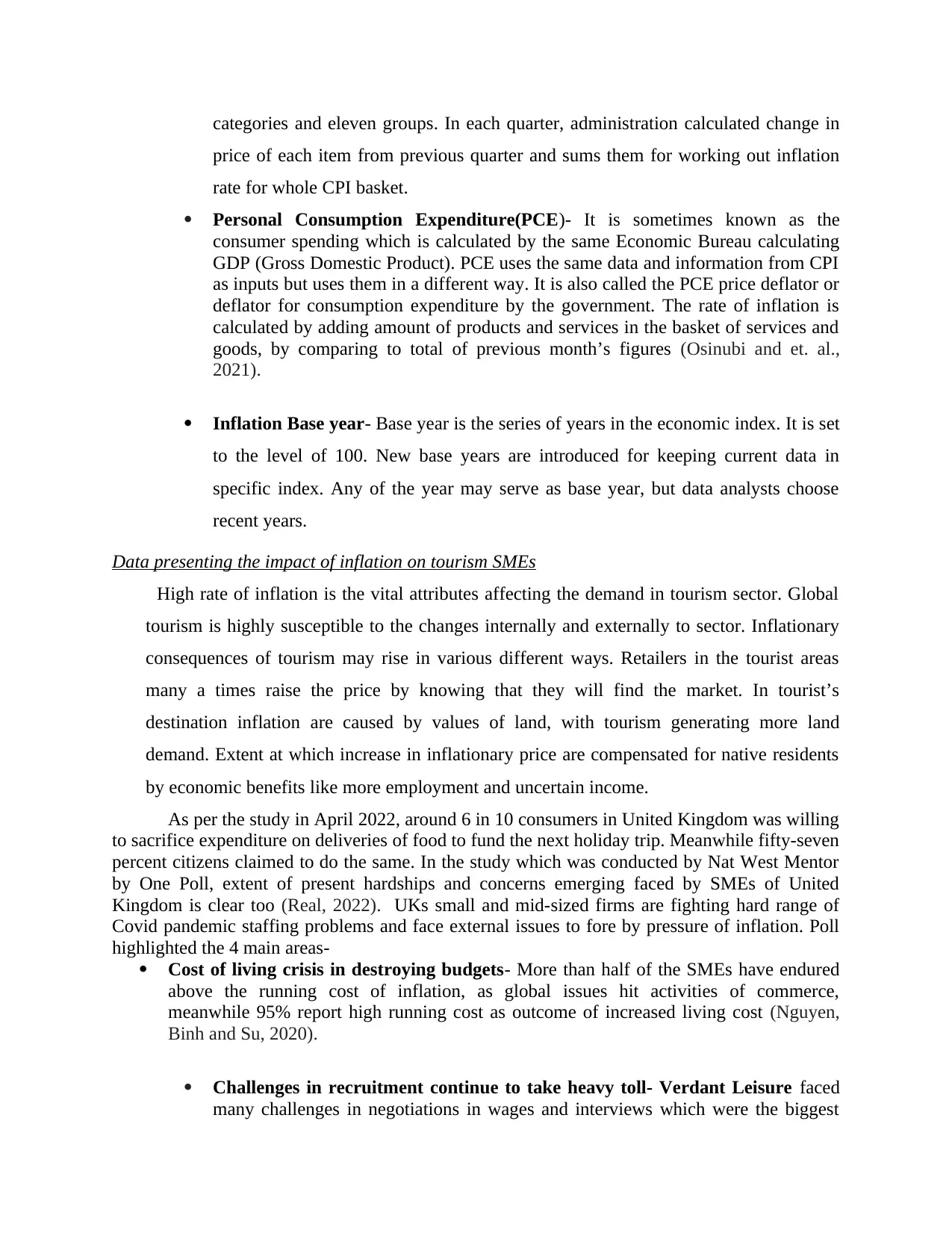
categories and eleven groups. In each quarter, administration calculated change in
price of each item from previous quarter and sums them for working out inflation
rate for whole CPI basket.
Personal Consumption Expenditure(PCE)- It is sometimes known as the
consumer spending which is calculated by the same Economic Bureau calculating
GDP (Gross Domestic Product). PCE uses the same data and information from CPI
as inputs but uses them in a different way. It is also called the PCE price deflator or
deflator for consumption expenditure by the government. The rate of inflation is
calculated by adding amount of products and services in the basket of services and
goods, by comparing to total of previous month’s figures (Osinubi and et. al.,
2021).
Inflation Base year- Base year is the series of years in the economic index. It is set
to the level of 100. New base years are introduced for keeping current data in
specific index. Any of the year may serve as base year, but data analysts choose
recent years.
Data presenting the impact of inflation on tourism SMEs
High rate of inflation is the vital attributes affecting the demand in tourism sector. Global
tourism is highly susceptible to the changes internally and externally to sector. Inflationary
consequences of tourism may rise in various different ways. Retailers in the tourist areas
many a times raise the price by knowing that they will find the market. In tourist’s
destination inflation are caused by values of land, with tourism generating more land
demand. Extent at which increase in inflationary price are compensated for native residents
by economic benefits like more employment and uncertain income.
As per the study in April 2022, around 6 in 10 consumers in United Kingdom was willing
to sacrifice expenditure on deliveries of food to fund the next holiday trip. Meanwhile fifty-seven
percent citizens claimed to do the same. In the study which was conducted by Nat West Mentor
by One Poll, extent of present hardships and concerns emerging faced by SMEs of United
Kingdom is clear too (Real, 2022). UKs small and mid-sized firms are fighting hard range of
Covid pandemic staffing problems and face external issues to fore by pressure of inflation. Poll
highlighted the 4 main areas-
Cost of living crisis in destroying budgets- More than half of the SMEs have endured
above the running cost of inflation, as global issues hit activities of commerce,
meanwhile 95% report high running cost as outcome of increased living cost (Nguyen,
Binh and Su, 2020).
Challenges in recruitment continue to take heavy toll- Verdant Leisure faced
many challenges in negotiations in wages and interviews which were the biggest
price of each item from previous quarter and sums them for working out inflation
rate for whole CPI basket.
Personal Consumption Expenditure(PCE)- It is sometimes known as the
consumer spending which is calculated by the same Economic Bureau calculating
GDP (Gross Domestic Product). PCE uses the same data and information from CPI
as inputs but uses them in a different way. It is also called the PCE price deflator or
deflator for consumption expenditure by the government. The rate of inflation is
calculated by adding amount of products and services in the basket of services and
goods, by comparing to total of previous month’s figures (Osinubi and et. al.,
2021).
Inflation Base year- Base year is the series of years in the economic index. It is set
to the level of 100. New base years are introduced for keeping current data in
specific index. Any of the year may serve as base year, but data analysts choose
recent years.
Data presenting the impact of inflation on tourism SMEs
High rate of inflation is the vital attributes affecting the demand in tourism sector. Global
tourism is highly susceptible to the changes internally and externally to sector. Inflationary
consequences of tourism may rise in various different ways. Retailers in the tourist areas
many a times raise the price by knowing that they will find the market. In tourist’s
destination inflation are caused by values of land, with tourism generating more land
demand. Extent at which increase in inflationary price are compensated for native residents
by economic benefits like more employment and uncertain income.
As per the study in April 2022, around 6 in 10 consumers in United Kingdom was willing
to sacrifice expenditure on deliveries of food to fund the next holiday trip. Meanwhile fifty-seven
percent citizens claimed to do the same. In the study which was conducted by Nat West Mentor
by One Poll, extent of present hardships and concerns emerging faced by SMEs of United
Kingdom is clear too (Real, 2022). UKs small and mid-sized firms are fighting hard range of
Covid pandemic staffing problems and face external issues to fore by pressure of inflation. Poll
highlighted the 4 main areas-
Cost of living crisis in destroying budgets- More than half of the SMEs have endured
above the running cost of inflation, as global issues hit activities of commerce,
meanwhile 95% report high running cost as outcome of increased living cost (Nguyen,
Binh and Su, 2020).
Challenges in recruitment continue to take heavy toll- Verdant Leisure faced
many challenges in negotiations in wages and interviews which were the biggest
Paraphrase This Document
Need a fresh take? Get an instant paraphrase of this document with our AI Paraphraser
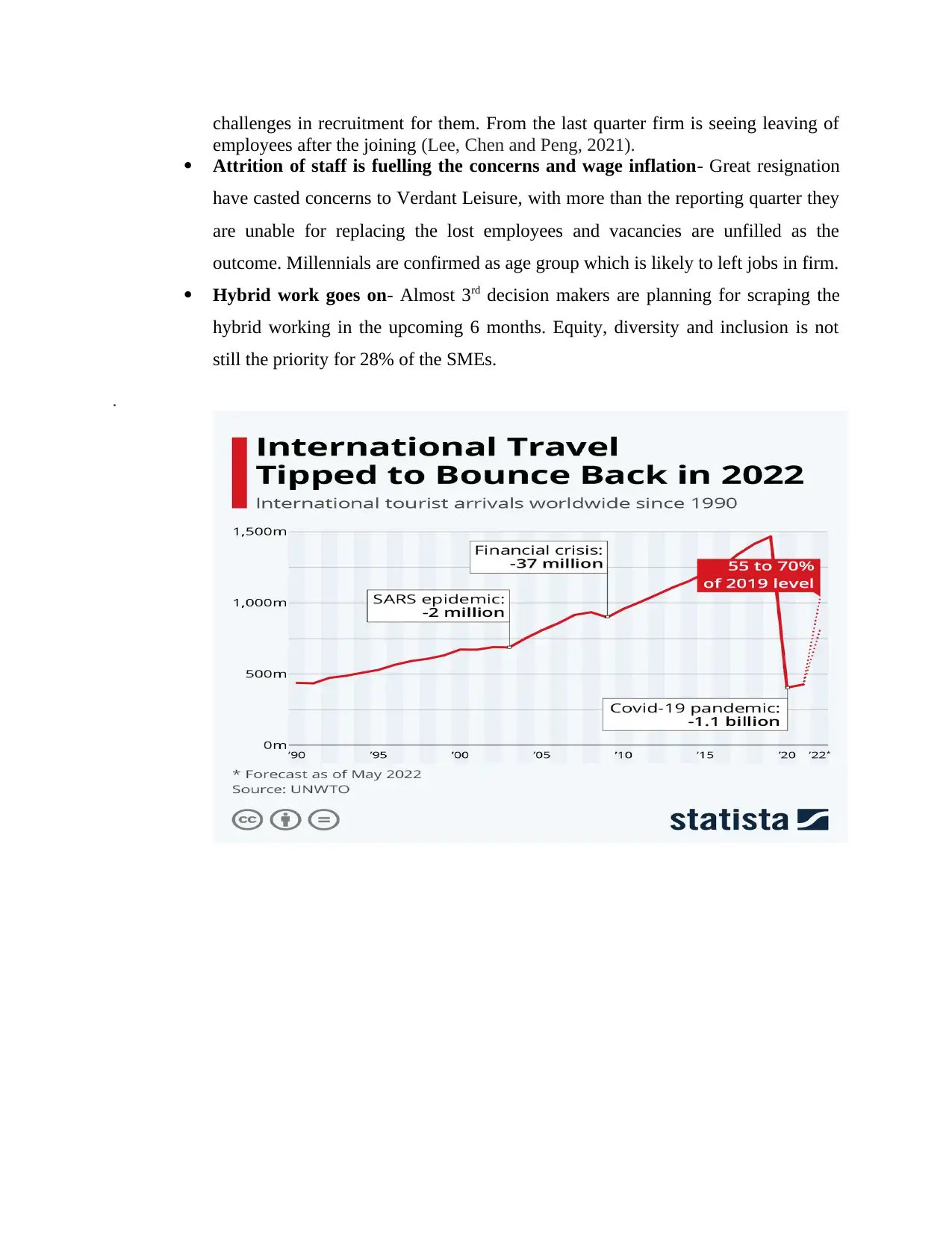
challenges in recruitment for them. From the last quarter firm is seeing leaving of
employees after the joining (Lee, Chen and Peng, 2021).
Attrition of staff is fuelling the concerns and wage inflation- Great resignation
have casted concerns to Verdant Leisure, with more than the reporting quarter they
are unable for replacing the lost employees and vacancies are unfilled as the
outcome. Millennials are confirmed as age group which is likely to left jobs in firm.
Hybrid work goes on- Almost 3rd decision makers are planning for scraping the
hybrid working in the upcoming 6 months. Equity, diversity and inclusion is not
still the priority for 28% of the SMEs.
.
employees after the joining (Lee, Chen and Peng, 2021).
Attrition of staff is fuelling the concerns and wage inflation- Great resignation
have casted concerns to Verdant Leisure, with more than the reporting quarter they
are unable for replacing the lost employees and vacancies are unfilled as the
outcome. Millennials are confirmed as age group which is likely to left jobs in firm.
Hybrid work goes on- Almost 3rd decision makers are planning for scraping the
hybrid working in the upcoming 6 months. Equity, diversity and inclusion is not
still the priority for 28% of the SMEs.
.
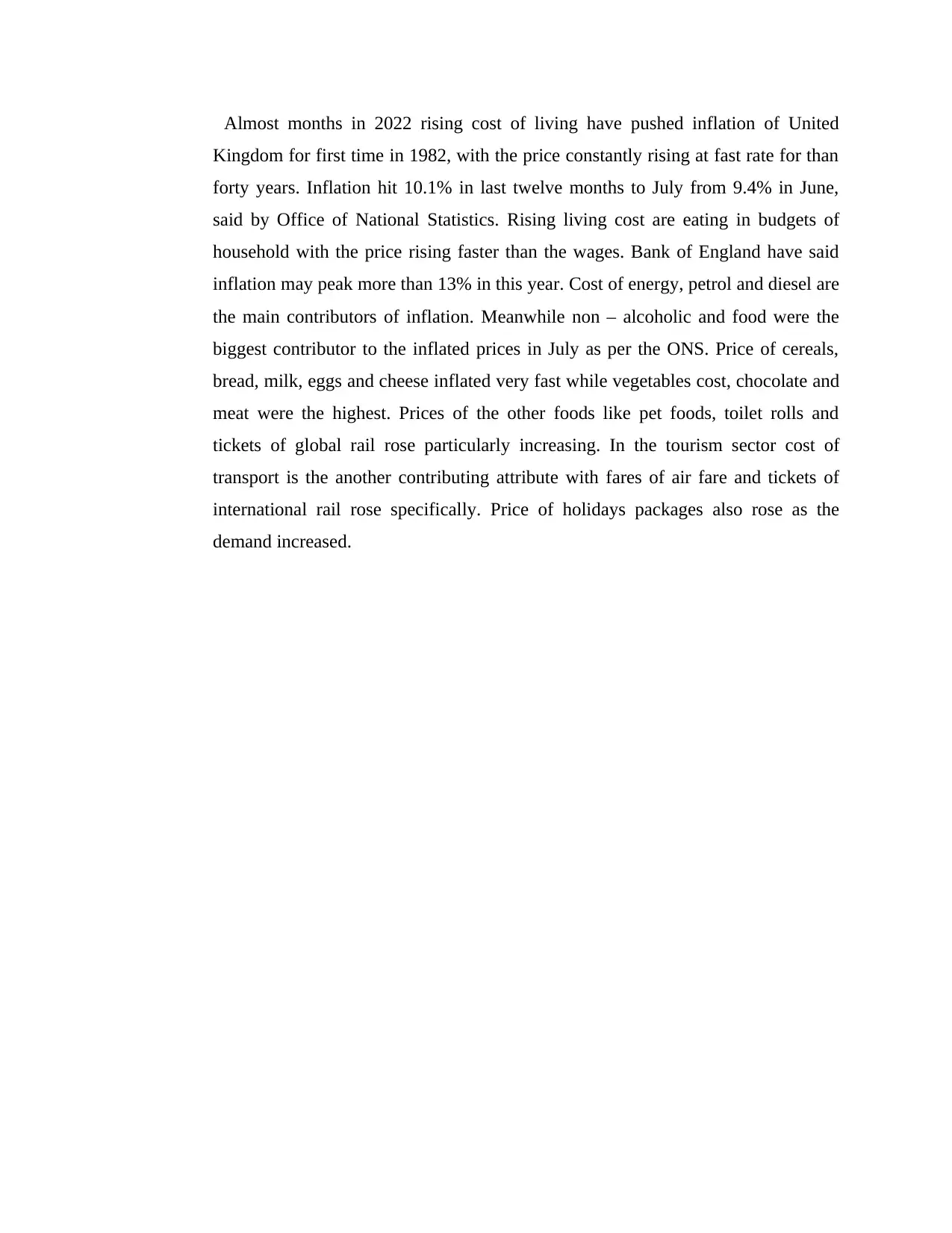
Almost months in 2022 rising cost of living have pushed inflation of United
Kingdom for first time in 1982, with the price constantly rising at fast rate for than
forty years. Inflation hit 10.1% in last twelve months to July from 9.4% in June,
said by Office of National Statistics. Rising living cost are eating in budgets of
household with the price rising faster than the wages. Bank of England have said
inflation may peak more than 13% in this year. Cost of energy, petrol and diesel are
the main contributors of inflation. Meanwhile non – alcoholic and food were the
biggest contributor to the inflated prices in July as per the ONS. Price of cereals,
bread, milk, eggs and cheese inflated very fast while vegetables cost, chocolate and
meat were the highest. Prices of the other foods like pet foods, toilet rolls and
tickets of global rail rose particularly increasing. In the tourism sector cost of
transport is the another contributing attribute with fares of air fare and tickets of
international rail rose specifically. Price of holidays packages also rose as the
demand increased.
Kingdom for first time in 1982, with the price constantly rising at fast rate for than
forty years. Inflation hit 10.1% in last twelve months to July from 9.4% in June,
said by Office of National Statistics. Rising living cost are eating in budgets of
household with the price rising faster than the wages. Bank of England have said
inflation may peak more than 13% in this year. Cost of energy, petrol and diesel are
the main contributors of inflation. Meanwhile non – alcoholic and food were the
biggest contributor to the inflated prices in July as per the ONS. Price of cereals,
bread, milk, eggs and cheese inflated very fast while vegetables cost, chocolate and
meat were the highest. Prices of the other foods like pet foods, toilet rolls and
tickets of global rail rose particularly increasing. In the tourism sector cost of
transport is the another contributing attribute with fares of air fare and tickets of
international rail rose specifically. Price of holidays packages also rose as the
demand increased.
⊘ This is a preview!⊘
Do you want full access?
Subscribe today to unlock all pages.

Trusted by 1+ million students worldwide
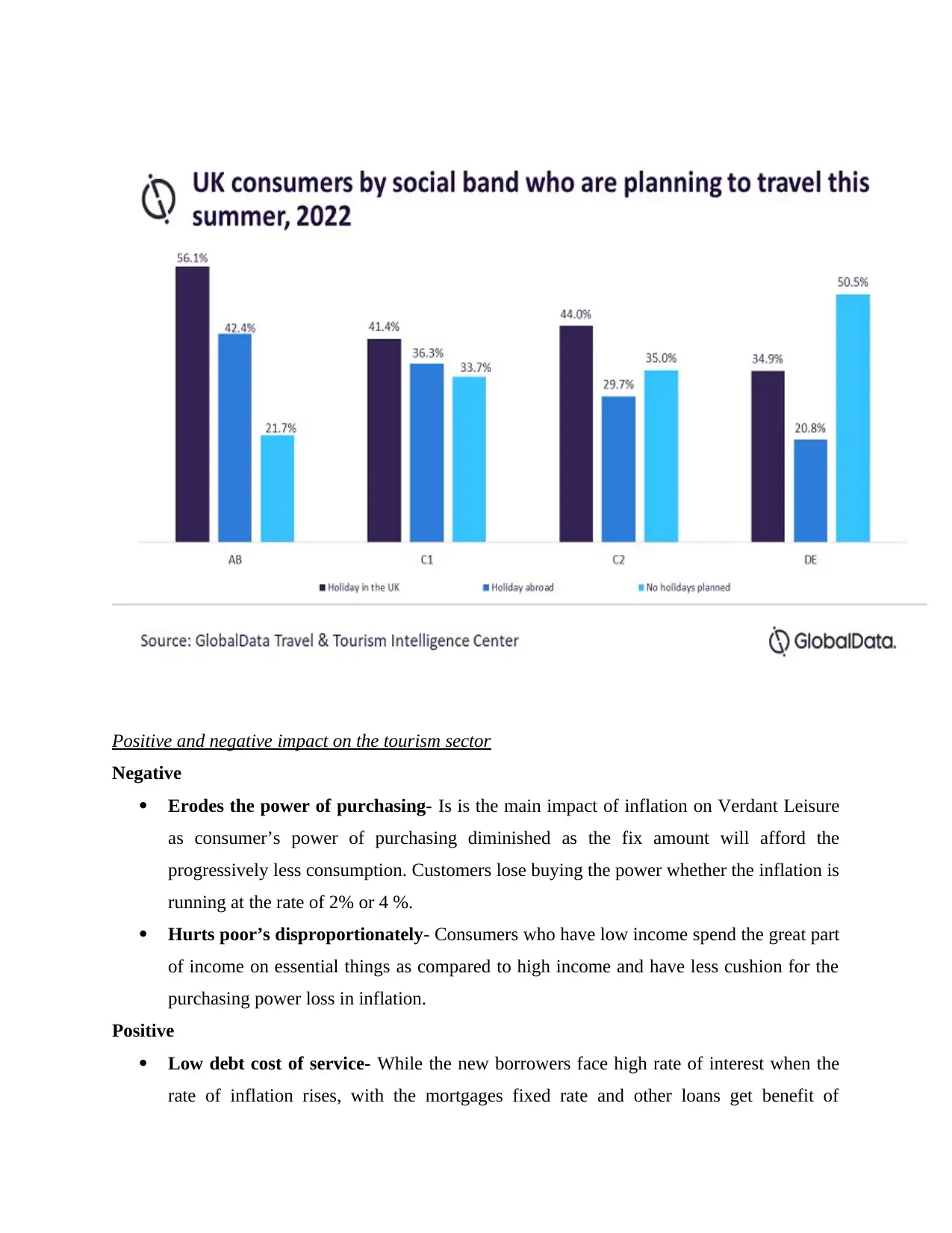
Positive and negative impact on the tourism sector
Negative
Erodes the power of purchasing- Is is the main impact of inflation on Verdant Leisure
as consumer’s power of purchasing diminished as the fix amount will afford the
progressively less consumption. Customers lose buying the power whether the inflation is
running at the rate of 2% or 4 %.
Hurts poor’s disproportionately- Consumers who have low income spend the great part
of income on essential things as compared to high income and have less cushion for the
purchasing power loss in inflation.
Positive
Low debt cost of service- While the new borrowers face high rate of interest when the
rate of inflation rises, with the mortgages fixed rate and other loans get benefit of
Negative
Erodes the power of purchasing- Is is the main impact of inflation on Verdant Leisure
as consumer’s power of purchasing diminished as the fix amount will afford the
progressively less consumption. Customers lose buying the power whether the inflation is
running at the rate of 2% or 4 %.
Hurts poor’s disproportionately- Consumers who have low income spend the great part
of income on essential things as compared to high income and have less cushion for the
purchasing power loss in inflation.
Positive
Low debt cost of service- While the new borrowers face high rate of interest when the
rate of inflation rises, with the mortgages fixed rate and other loans get benefit of
Paraphrase This Document
Need a fresh take? Get an instant paraphrase of this document with our AI Paraphraser
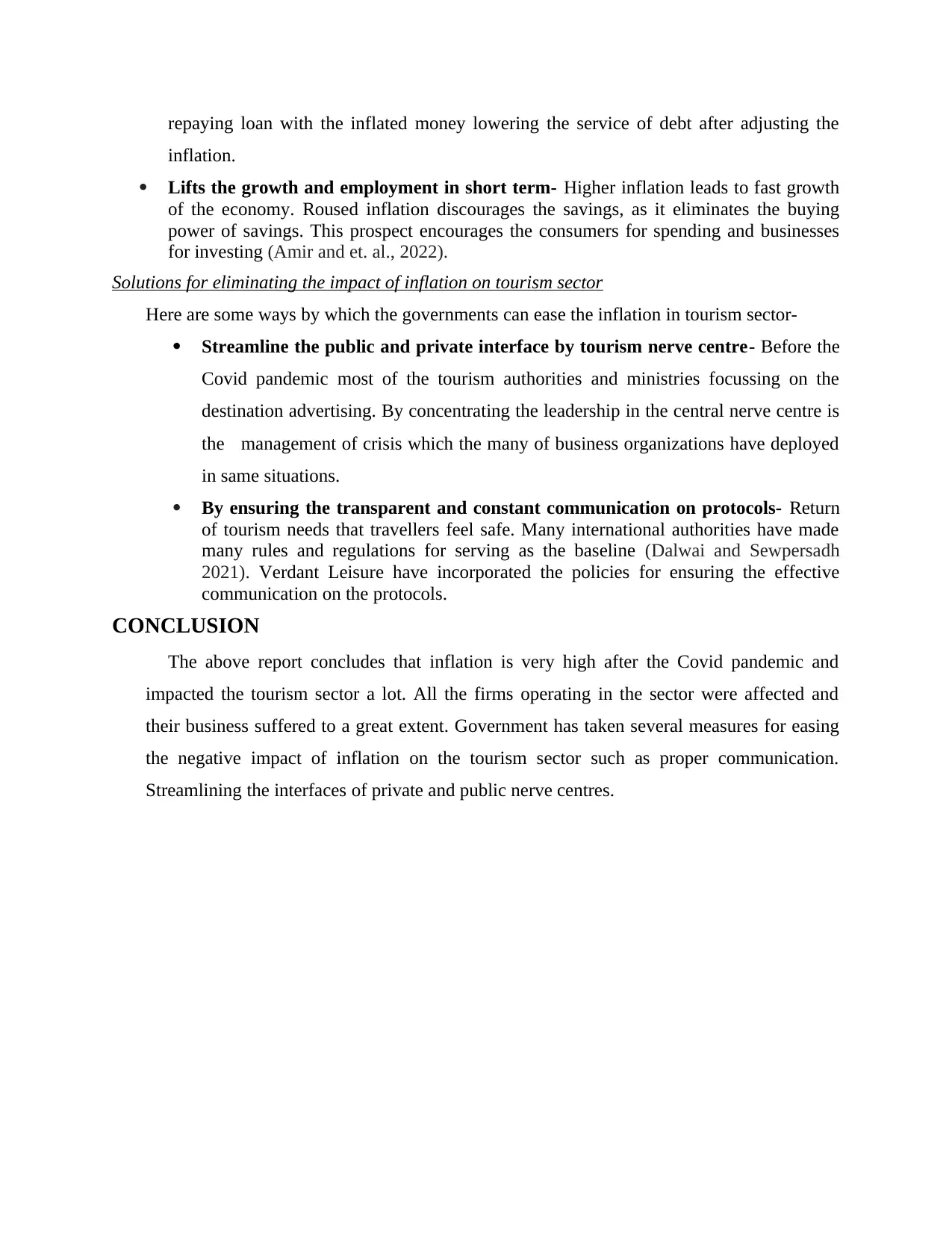
repaying loan with the inflated money lowering the service of debt after adjusting the
inflation.
Lifts the growth and employment in short term- Higher inflation leads to fast growth
of the economy. Roused inflation discourages the savings, as it eliminates the buying
power of savings. This prospect encourages the consumers for spending and businesses
for investing (Amir and et. al., 2022).
Solutions for eliminating the impact of inflation on tourism sector
Here are some ways by which the governments can ease the inflation in tourism sector-
Streamline the public and private interface by tourism nerve centre- Before the
Covid pandemic most of the tourism authorities and ministries focussing on the
destination advertising. By concentrating the leadership in the central nerve centre is
the management of crisis which the many of business organizations have deployed
in same situations.
By ensuring the transparent and constant communication on protocols- Return
of tourism needs that travellers feel safe. Many international authorities have made
many rules and regulations for serving as the baseline (Dalwai and Sewpersadh
2021). Verdant Leisure have incorporated the policies for ensuring the effective
communication on the protocols.
CONCLUSION
The above report concludes that inflation is very high after the Covid pandemic and
impacted the tourism sector a lot. All the firms operating in the sector were affected and
their business suffered to a great extent. Government has taken several measures for easing
the negative impact of inflation on the tourism sector such as proper communication.
Streamlining the interfaces of private and public nerve centres.
inflation.
Lifts the growth and employment in short term- Higher inflation leads to fast growth
of the economy. Roused inflation discourages the savings, as it eliminates the buying
power of savings. This prospect encourages the consumers for spending and businesses
for investing (Amir and et. al., 2022).
Solutions for eliminating the impact of inflation on tourism sector
Here are some ways by which the governments can ease the inflation in tourism sector-
Streamline the public and private interface by tourism nerve centre- Before the
Covid pandemic most of the tourism authorities and ministries focussing on the
destination advertising. By concentrating the leadership in the central nerve centre is
the management of crisis which the many of business organizations have deployed
in same situations.
By ensuring the transparent and constant communication on protocols- Return
of tourism needs that travellers feel safe. Many international authorities have made
many rules and regulations for serving as the baseline (Dalwai and Sewpersadh
2021). Verdant Leisure have incorporated the policies for ensuring the effective
communication on the protocols.
CONCLUSION
The above report concludes that inflation is very high after the Covid pandemic and
impacted the tourism sector a lot. All the firms operating in the sector were affected and
their business suffered to a great extent. Government has taken several measures for easing
the negative impact of inflation on the tourism sector such as proper communication.
Streamlining the interfaces of private and public nerve centres.
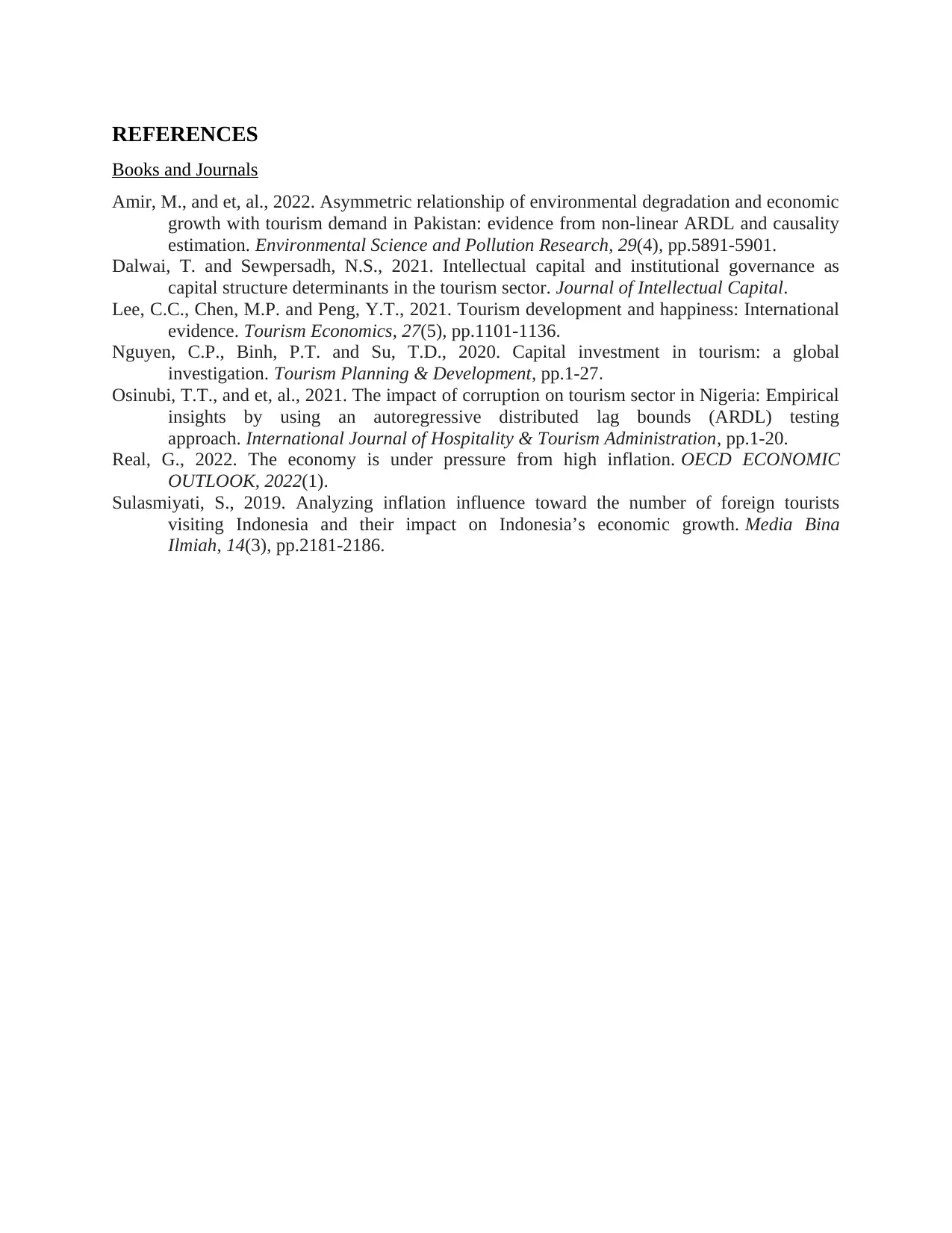
REFERENCES
Books and Journals
Amir, M., and et, al., 2022. Asymmetric relationship of environmental degradation and economic
growth with tourism demand in Pakistan: evidence from non-linear ARDL and causality
estimation. Environmental Science and Pollution Research, 29(4), pp.5891-5901.
Dalwai, T. and Sewpersadh, N.S., 2021. Intellectual capital and institutional governance as
capital structure determinants in the tourism sector. Journal of Intellectual Capital.
Lee, C.C., Chen, M.P. and Peng, Y.T., 2021. Tourism development and happiness: International
evidence. Tourism Economics, 27(5), pp.1101-1136.
Nguyen, C.P., Binh, P.T. and Su, T.D., 2020. Capital investment in tourism: a global
investigation. Tourism Planning & Development, pp.1-27.
Osinubi, T.T., and et, al., 2021. The impact of corruption on tourism sector in Nigeria: Empirical
insights by using an autoregressive distributed lag bounds (ARDL) testing
approach. International Journal of Hospitality & Tourism Administration, pp.1-20.
Real, G., 2022. The economy is under pressure from high inflation. OECD ECONOMIC
OUTLOOK, 2022(1).
Sulasmiyati, S., 2019. Analyzing inflation influence toward the number of foreign tourists
visiting Indonesia and their impact on Indonesia’s economic growth. Media Bina
Ilmiah, 14(3), pp.2181-2186.
Books and Journals
Amir, M., and et, al., 2022. Asymmetric relationship of environmental degradation and economic
growth with tourism demand in Pakistan: evidence from non-linear ARDL and causality
estimation. Environmental Science and Pollution Research, 29(4), pp.5891-5901.
Dalwai, T. and Sewpersadh, N.S., 2021. Intellectual capital and institutional governance as
capital structure determinants in the tourism sector. Journal of Intellectual Capital.
Lee, C.C., Chen, M.P. and Peng, Y.T., 2021. Tourism development and happiness: International
evidence. Tourism Economics, 27(5), pp.1101-1136.
Nguyen, C.P., Binh, P.T. and Su, T.D., 2020. Capital investment in tourism: a global
investigation. Tourism Planning & Development, pp.1-27.
Osinubi, T.T., and et, al., 2021. The impact of corruption on tourism sector in Nigeria: Empirical
insights by using an autoregressive distributed lag bounds (ARDL) testing
approach. International Journal of Hospitality & Tourism Administration, pp.1-20.
Real, G., 2022. The economy is under pressure from high inflation. OECD ECONOMIC
OUTLOOK, 2022(1).
Sulasmiyati, S., 2019. Analyzing inflation influence toward the number of foreign tourists
visiting Indonesia and their impact on Indonesia’s economic growth. Media Bina
Ilmiah, 14(3), pp.2181-2186.
⊘ This is a preview!⊘
Do you want full access?
Subscribe today to unlock all pages.

Trusted by 1+ million students worldwide
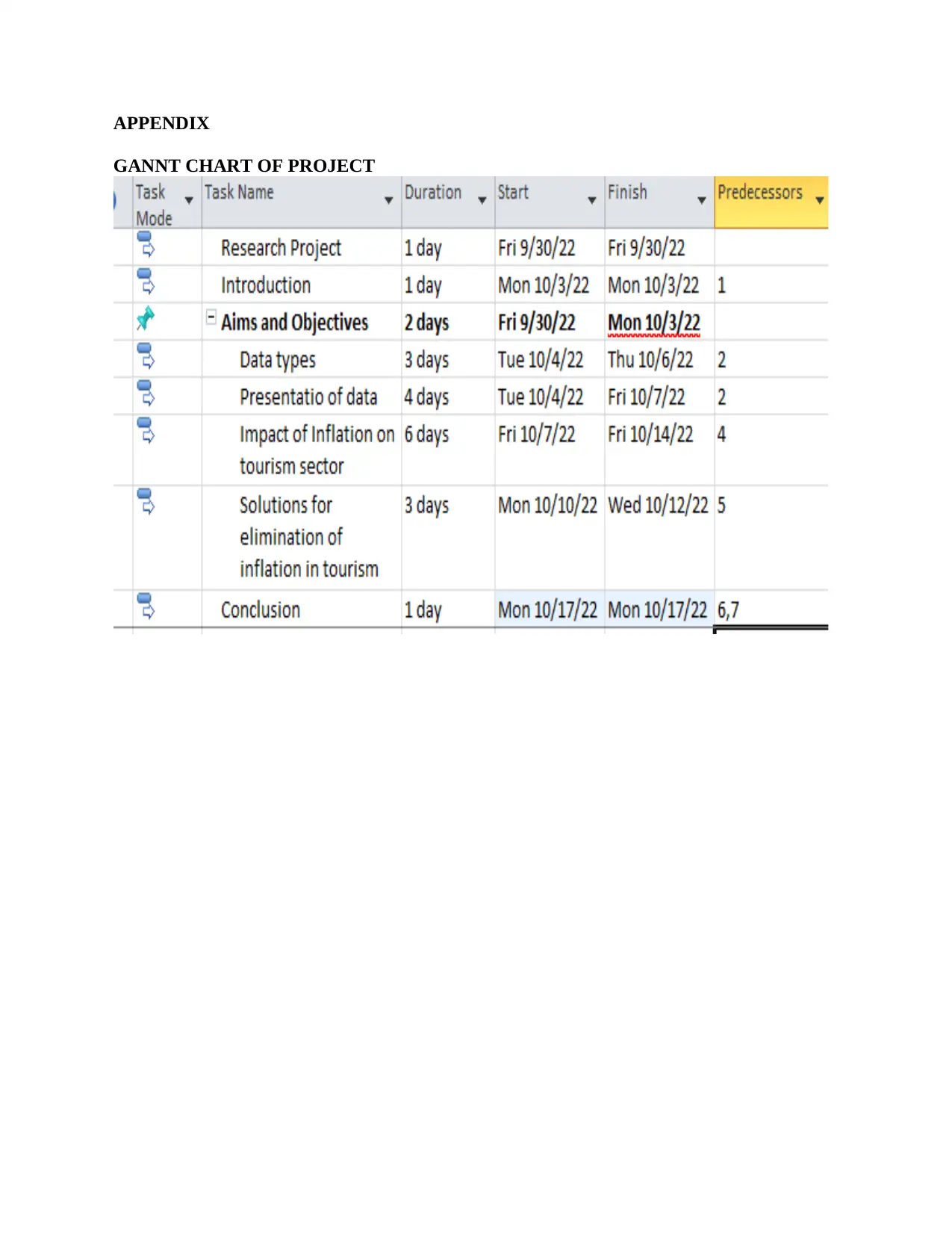
APPENDIX
GANNT CHART OF PROJECT
GANNT CHART OF PROJECT
Paraphrase This Document
Need a fresh take? Get an instant paraphrase of this document with our AI Paraphraser
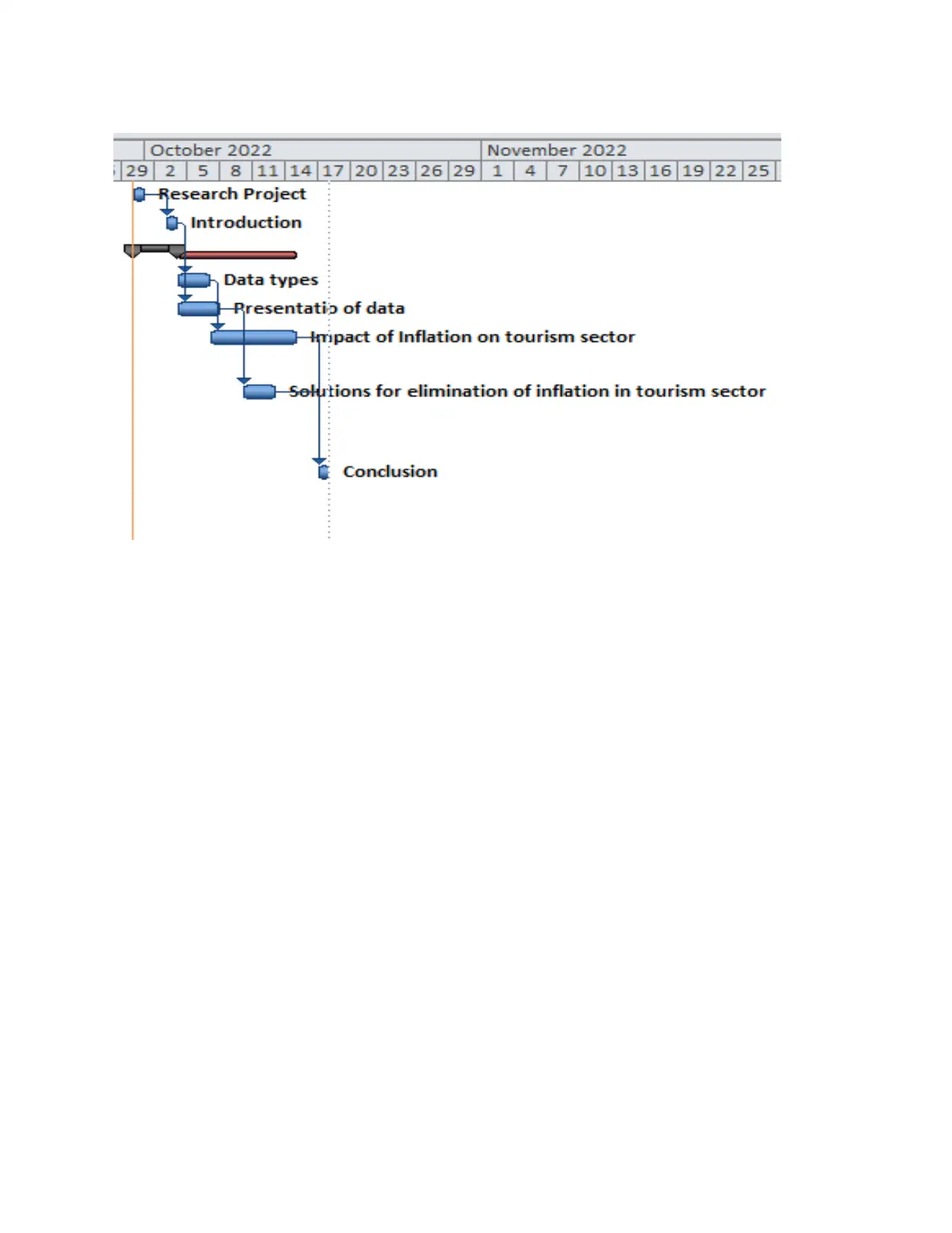
1 out of 11
Related Documents
Your All-in-One AI-Powered Toolkit for Academic Success.
+13062052269
info@desklib.com
Available 24*7 on WhatsApp / Email
![[object Object]](/_next/static/media/star-bottom.7253800d.svg)
Unlock your academic potential
Copyright © 2020–2026 A2Z Services. All Rights Reserved. Developed and managed by ZUCOL.


